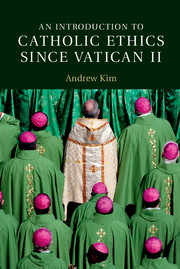Book contents
- Frontmatter
- Dedication
- Epigraph
- Contents
- Foreword
- Preface
- Acknowledgments
- Abbreviations
- Introduction
- PART 1 FOUNDATIONS OF CATHOLIC ETHICS
- PART II GRACE AT THE HEART OF VIRTUE
- PART III CATHOLIC SOCIAL TEACHING
- PART IV BIOETHICS
- 10 The Dignity of the Human Person
- 11 Beginning of Life Decisions
- 12 End of Life Decisions
- Epilogue
- Appendix
- Bibliography
- Index
12 - End of Life Decisions
from PART IV - BIOETHICS
Published online by Cambridge University Press: 05 May 2015
- Frontmatter
- Dedication
- Epigraph
- Contents
- Foreword
- Preface
- Acknowledgments
- Abbreviations
- Introduction
- PART 1 FOUNDATIONS OF CATHOLIC ETHICS
- PART II GRACE AT THE HEART OF VIRTUE
- PART III CATHOLIC SOCIAL TEACHING
- PART IV BIOETHICS
- 10 The Dignity of the Human Person
- 11 Beginning of Life Decisions
- 12 End of Life Decisions
- Epilogue
- Appendix
- Bibliography
- Index
Summary
By Christ's Passion man knows thereby how much God loves him, and is thereby stirred to love God in return, and herein lies the completion of human salvation.
St. Thomas Aquinas, Summa Theologiae IIIa q. 46 a. 3The word “euthanasia” means “mercy killing.” In the latter part of the twentieth century advocates of the practice sought vigorously to get it accepted as a legal medical procedure, which normally involved injecting a patient with lethal chemicals meant to induce painless death. There are two kinds of euthanasia: voluntary and involuntary. The former means that the patient has given formal consent either through an advanced directive or, if they are conscious and lucid, directly to the doctor. Involuntary euthanasia generally involves patients in comas or severely impaired states who are not physically capable of giving consent. The movement to legalize euthanasia in the United States had mixed results. Its most vocal advocate and practitioner, Jack Kevorkian, was imprisoned but also is seen as a martyr by euthanasia advocates. The two-fold purpose of this final chapter is both to make clear why Catholic teaching condemns this practice and to respond to the significant problems euthanasia raises in a unique way regarding human suffering.
THE CATHOLIC RESPONSE TO EUTHANASIA
To begin with, let us clarify the Catholic teaching. This is more complicated than some suppose. It is true that euthanasia clearly violates the Catholic moral tradition: “Euthanasia is an action or omission that of itself or by intention causes death in order to alleviate suffering. Catholic health care institutions may never condone or participate in euthanasia or assisted suicide in any way” (no. 60). Seems clear enough, right? But what is this “omission” business about? Well, suppose that a patient needs some kind of artificial life support like a ventilator, hydration, or a feeding tube. To intentionally omit these things in order to cause death is still a form of euthanasia.
- Type
- Chapter
- Information
- An Introduction to Catholic Ethics since Vatican II , pp. 167 - 177Publisher: Cambridge University PressPrint publication year: 2015



